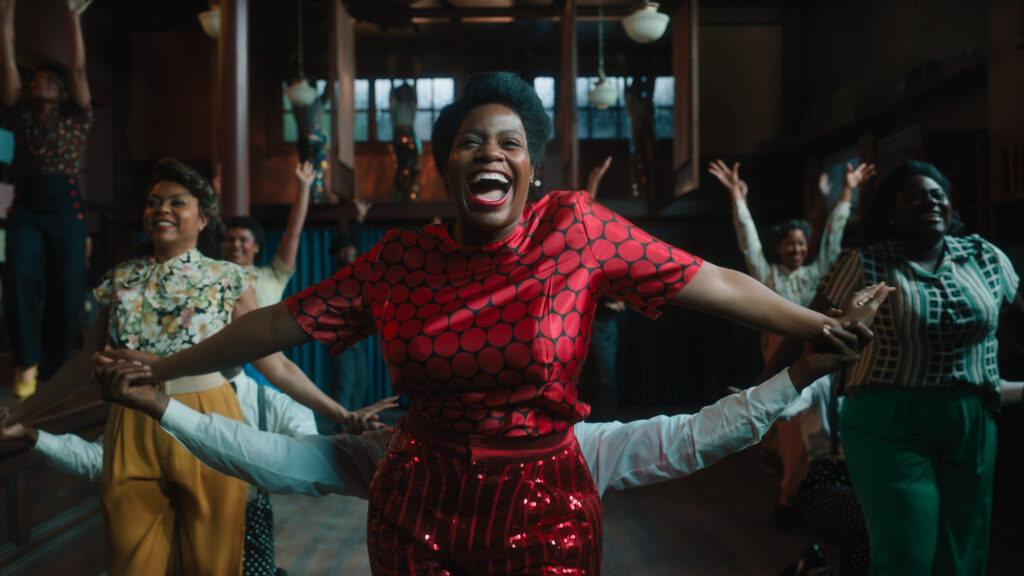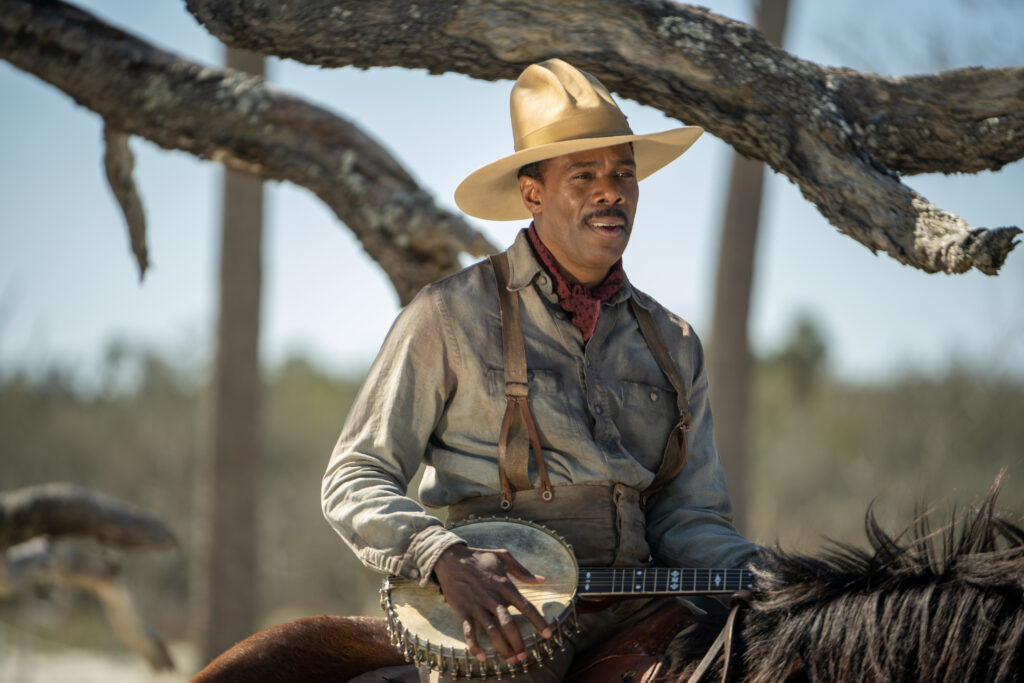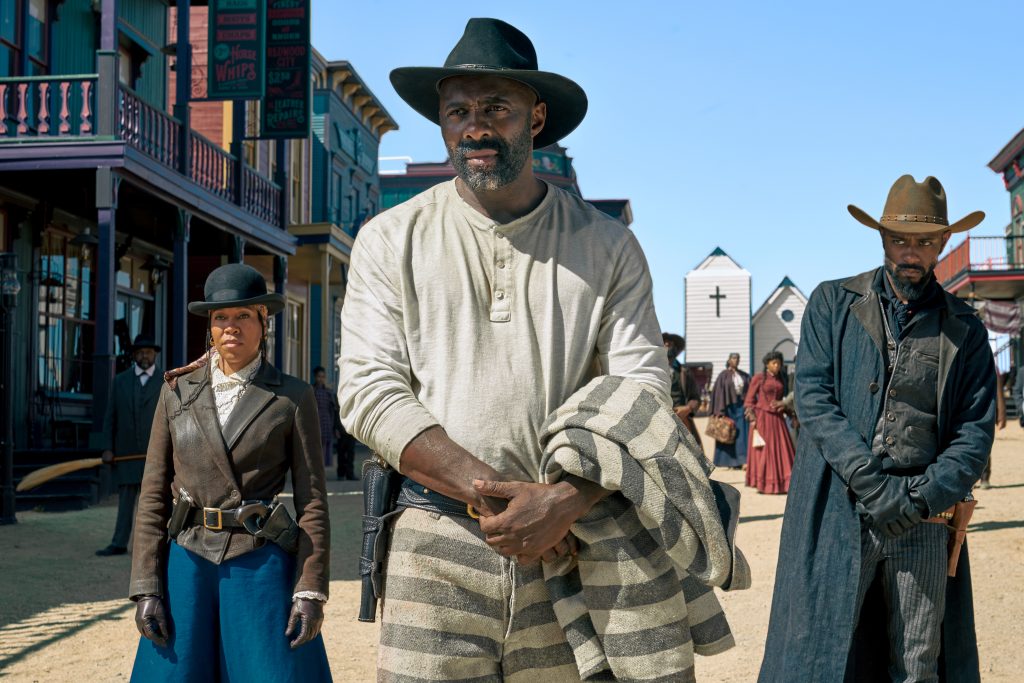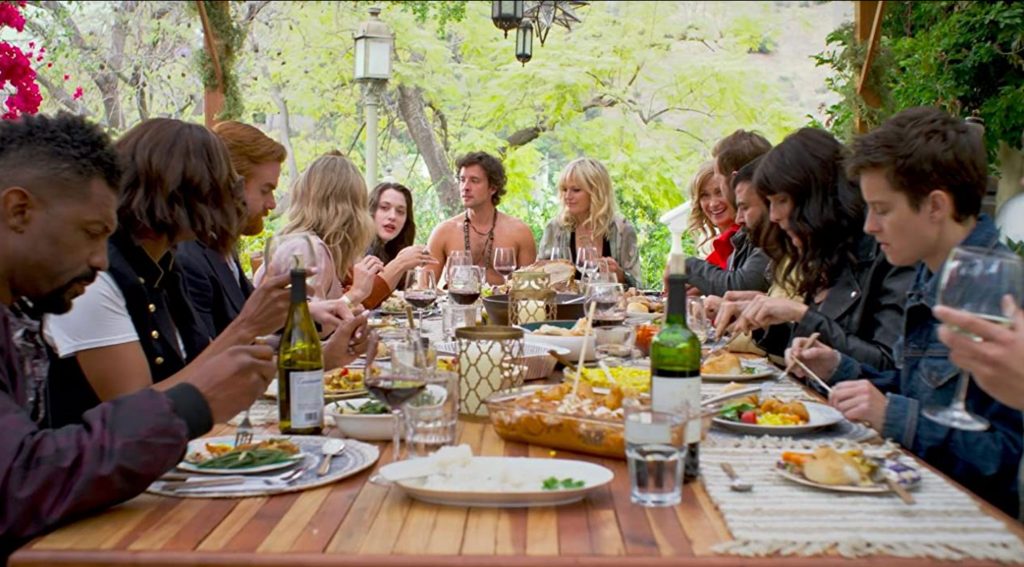December 19, 2023
by Carla Hay

Directed by Blitz Bazawule
Culture Representation: Taking place in Georgia and in Tennessee, from 1909 to 1947, the musical “The Color Purple” (which is inspired by Alice Walker’s 1982 novel of the same name) features a predominantly African American group of characters (with some white people) representing the working-class, middle-class and wealthy.
Culture Clash: An oppressed woman named Celie endures horrific abuse and a forced separation from her beloved sister, but she meets certain people who change her outlook on life.
Culture Audience: In addition to appealing to the obvious target audience of fans of “The Color Purple” book and its various adaptations, the movie musical version of “The Color Purple” will appeal primarily to fans of the movie’s headliners and filmmakers, as well as to people who don’t mind watching musicals that shows extremes in human emotions.

The movie musical “The Color Purple” creatively blends emotional highs and lows in this glitzier version of the book and the 1985 dramatic movie. More comedy and joy balance out the trauma and abuse, but the overall theme of resilience remains the same. Some fans of Alice Walker’s “The Color Purple” novel and some fans of director Steven Spielberg’s 1985 “The Color Purple” movie might not warm to this movie musical if they’re offended by the thought of putting song-and-dance numbers in the most upsetting parts of the story, or if they don’t like how the musical alters key parts of the original story in the novel, including the ending. However, fans of the “The Color Purple” stage musical will be pleased by how the 2023 version of “The Color Purple” is faithful to the stage musical while bringing a vibrant cinematic life of its own.
Directed by Blitz Bazawule and written by Marcus Gardley, the 2023 movie musical version of “The Color Purple” astutely depicts the movie’s most fantastical and elaborate production designs as being manifestations of the imagination of protagonist Celie (played by Fantasia Barrino) during moments in her life when she’s dreaming of escaping from her grim circumstances. It’s a manifestation that is ideal for the visual medium of cinema, which has the benefit of film editing that a stage production does not.
The Tony-winning “The Color Purple” stage musical had its first Broadway run from 2005 to 2008; has gone through various touring incarnations; and experienced a successful Broadway revival from 2015 to 2017. Barrino played the role of Celie on Broadway from 2006 to 2007. Marsha Norman wrote the book for the stage musical, whose music and lyrics were written by Brenda Russell, Allee Willis and Stephen Bray. The songs range from expressing the depths of despair of a mother who has a child taken a way from her (“Somebody Gonna Love You”); the defiant declaration of not putting up with abuse (“Hell No”); the sultry seduction of adults freely expressing their sexuality (“Push Da Button”); and the triumph of independence and self-acceptance (“I’m Here”).
What “The Color Purple” stage musical and movies have in common are the involvement of Oprah Winfrey and Quincy Jones. Jones was a producer and composer for the 1985 “The Color Purple” movie, and he continued in the role of producer for the stage musical and the 2023 “The Color Purple” movie. Winfrey made her Oscar-nominated movie debut as an actress in 1985’s “The Color Purple,” and she’s a producer of the stage musical and the 2023 “The Color Purple” movie. Spielberg is a producer of “The Color Purple” movies, while Scott Sanders is a producer of “The Color Purple” stage musical and the 2023 version of “The Color Purple.”
“The Color Purple” movie musical (which takes place in Georgia and Tennessee) begins in 1909 in an unnamed rural area of Georgia, where 14-year-old Celie Harris (played by Phylicia Pearl Mpasi) has given birth to her second child: a son. Celie’s father Alfonso (played by Deon Cole) snatches the child away and cruelly tells Celie that she will never see this child again. He did the same thing when Celie gave birth to her first child, who was a daughter. Both pregnancies resulted from Alfonso raping Celie. It’s implied that Alfonso sold both children to be illegally adopted.
The only happiness that Celie experiences in her life is from her close relationship with her younger sister Nettie (played by Halle Bailey), who is very protective of the more insecure Celie. Nettie is the person who teaches Celie to read. They spend hours reading together, often in a tree, where they can’t be seen by their horrible father.
Alfonso isn’t done selling members of his family. A widower farmer named Albert “Mister” Johnson (played by Colman Domingo) is an abusive bully who is looking for a new wife. He insists that most people call him Mister. Mister is attracted to Nettie, but Alphonso will only allow Mister to marry Celie, who is sold into this marriage by her father when Celie is 18 years old. Barrino portrays Celie as an adult. The rest of the movie shows what happens to Celie through a period of time spanning to 1947.
In the first year of Mister and Celie’s miserable marriage, he lets Nettie live in the same household. But when Nettie rejects Mister’s sexual advances, he evicts her from the house and tells her that she can never come back. This forced separation scene isn’t as heart-wrenching as how it was in the 1985 “The Color Purple” movie, but it’s still one of the more emotionally difficult scenes to watch. Nettie promises to write to Celie every day, but Mister intercepts the letters because he tells fearful Celie (who has been beaten into submission by Mister) that he is the only person in the household who is allowed to handle the mail.
During the worst parts of Celie’s life, she meets certain people who have different effects on how she sees herself and others. Shug Avery (played by Taraji P. Henson) is a Memphis-based jazz and blues singer, who is open about her fluid sexuality. Shug is considered the “morally wayward” daughter of Reverend Avery (played by David Alan Grier), the leader of the local church attended by African American people in Celie’s area.
Mister has been in love with Shug for years. He acts like a giddy schoolboy, every time she visits the area. However, she treats him more like a sexual plaything, and she refuses Mister’s wish to make him her only lover. Mister and Shug openly carry on an affair when she’s visiting. What Shug doesn’t expect is to befriend Celie, who sees life from an entirely new perspective when she gets to know confident and sassy Shug. The connection between Celie and Shug goes beyond friendship into sexual intimacy.
Harpo Jackson (played by Corey Hawkins) is Mister’s sensitive adult son, who falls in love, marries, and starts a family with a feisty and outspoken woman named Sofia (played by Danielle Brooks), who doesn’t hesitate to get involved in physical brawls if anyone tries to pick a fight with her. The marriage of easygoing Harpo and domineering Sofia goes through ups and downs. At one point, they break up, and Harpo moves on to having a live-in girlfriend named Squeak (played by H.E.R.), who gets caught in the middle of the volatile relationship between Sofia and Harpo.
With a cast this talented and with breathtaking musical numbers (including dazzling choreography from Fatima Robinson), it’s hard to go wrong in this musical version of “The Color Purple.” This version of the story puts more emphasis on the “sisterhood” of Celie, Shug and Sofia, compared to the original story that makes Celie much more of a loner character much longer in the story. All three women have their own trials and tribulations in a society that expects them to allow their lives to be dictated and controlled by men.
Barrino, Henson and Brooks are standouts in their own right in this movie. Barrino’s Celie is often downtrodden but never completely pathetic, as she maintain her dignity during all much emotional and physical abuse that is inflicted on her. Barrino depicts Celie with slightly more intelligence than Whoopi Goldberg’s Oscar-nominated portrayal of Celie in 1985’s “The Color Purple.” (A plot development in the last third of the movie shows Celie getting a life.
Henson puts a more comedic and lively spin on Shug, who has more comeback quips than Margaret Avery’s more understated, Oscar-nominated version of Shug in 1985’s “The Color Purple.” Henson’s Shug (especially during the musical numbers) is bold, brash and not at all interested in being subtle. In this movie, Shug’s signature song “Push Da Button” is every bit the decadent extravaganza that is should be.
Brooks, who had the Tony-nominated role of Sofia in the Broadway revival of “The Color Purple,” is a scene stealer not just with her acting but also with her powerhouse singing. She’s arguably the strongest vocalist in this entire cast. Beyond the vocal theatrics, Brooks brings a swagger to the role of Sofia, whereas Winfrey’s version of Sofia had more stomping. Sofia is lovably flawed with a fiery temper that gets easily triggered, because she’s lived her life constantly being on the defensive from personal attacks.
The original “The Color Purple” novel and movie got some criticism for its portrayal of African American men as being either abusive or wishy-washy. In this version of “The Color Purple,” Mister is not depicted as an irredeemable villain. There are glimpses of his vulnerability, such as his fear of his cantankerous and misogynistic father Ol’ Mister (played by Louis Gossett Jr.), who scolds Mister for not being controlling enough of Celie.
Some viewers might have a problem with a certain turning point in Mister’s story arc that’s very different from the novel, but the intention seems to be to make Mister more human and less of a one-dimensional villain. Domingo as Mister handles this balancing act with considerable skill. The father/son relationship between Mister and Harpo is explored in more depth in addressing issues of how toxic masculinity can be passed down in a family for generations, unless someone in the family is willing to stop the cycle.
Even in settings where many of the characters live in poverty, “The Color Purple” is rich in its depiction of African American culture at this particular time in this region of the United States. The scenes that take place in Celie’s imagination are entirely consistent with how Celie dreams about how her life could be more glamorous and happier than it really is. An inspired set design shows Celie giving Shug a bath, while the bathtub revolves on a giant gramophone turntable.
“The Color Purple” can certainly spark debate about whether or not the world needs another version of Walker’s Pulitzer Prize-winning novel. And there are definitely worthy discussions to be had about why so many “awards bait” movies centered on African Americans have a lot of violence, poverty and/or trauma. But for what it is in depicting a specific group of African Americans during a time in American history before the U.S. civil rights movement, this version of “The Color Purple” is a worthy adaptation that gives each of the principal characters clear and distinctive personalities and varied ways to better understand who they are.
Warner Bros. Pictures will release “The Color Purple” in U.S. cinemas on December 25, 2023. UPDATE: The movie will be released on digital and VOD on January 16, 2024.






